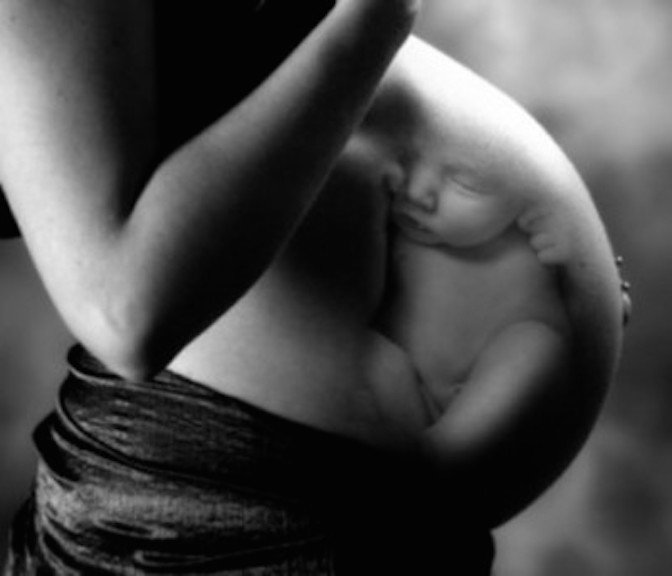In response to a pro-abortion message on Twitter, actress Rose McGowan, known for her roles in the ‘90s movies Charmed and Scream, revealed that she had an abortion. “I am not ashamed, nor should you be,” McGowan said. McGowan is just one of many public figures who have begun to share abortion stories in an attempt to normalize abortion, which they see as no more objectionable than having your teeth cleaned. After all, what is so objectionable about “my body, my choice”?
Unlike past pro-abortion advocates, McGowan is one of many modern activists who refuse to consider the humanity of the preborn baby. For them, abortion can be a positive and justifiable good for the woman to defend her autonomy, regardless of the status of the baby. As McGowan stated, “I realized I could not bring a child into my world and simultaneously change the world.” Reading between the lines, we see that those like McGowan view a baby as an invader or a parasite that would inconvenience their “world.” And they believe a woman should not be ashamed of defending herself and her “world” against this.
The “no-regrets” abortion campaign is another sad manifestation of the troubling bodily autonomy argument. It is an argument that leads to frightening conclusions. The claim is essentially that someone else, including a preborn baby, can only encroach upon your body with your explicit permission. For those like McGowan, a baby must have that permission in order to “use” the mother’s organs. If he doesn’t have that permission, she can “remove” him by the process of abortion.
This line of thinking is behind much of current push for late-term abortion. It can even be seen in the creeping acceptance of infanticide by some. If McGowan’s “world” would be threatened by a preborn baby, what changes when the baby is viable — or even an abortion survivor? In the bodily autonomy argument, with the humanity of the baby not even considered, the demands that the baby places on the mother’s body and her “world” are the only measure of whether a baby’s life is “worth” preserving. No wonder, then, that abortion up until birth is deemed so a vital part of the pro-abortion agenda for some as to be enshrined in law in New York.
READ: Parenthood, responsibility, and bodily autonomy
The idea of the “right of women to control their bodies” — regardless of the cost to other human lives — is growing louder and louder. It is the philosophy that stands behind the Shout Your Abortion movement. It is a philosophy that can be seen in more and more statements by prominent politicians. New Mexico Governor Michelle Grisham stunningly claimed in an op-ed that “women have the absolute right to decide what they will do with their bodies.” When 2020 presidential candidate Kamala Harris was asked whether she thought abortion was ever immoral, she told the Daily Caller: “I think it’s up to a woman to make that decision, and I will always stand by that.” Likely Democrat 2020 frontrunner Joe Biden used this kind of argument to justify his stance in the 2012 VP debate:
“With regard to abortion, I accept my church’s position that life begins at conception. That’s the church’s judgment. I accept it in my personal life. But I refuse to impose it on equally devout Christians and Muslims and Jews and–I just refuse to impose that on others, unlike my friend here, the congressman. I do not believe that we have a right to tell other people that women can’t control their body.”
For pro-lifers, the heart of the matter is simple: a child should never be seen as an attacker or parasite bent on doing the mother harm. The humanity of the preborn child gives that child rights. As pro-life apologist Stephanie Gray puts it, “If someone is starving in my town, although it’s nice if I feed them, I won’t be charged with neglect if I don’t. But if I have my child in my home, I have to feed them. I have a responsibility. It follows that pregnancy is a parent/child relationship, and if the parent has to feed, clothe, and shelter their born child, they need to feed, clothe, and shelter their preborn child.”
The child does not choose to be in his mother’s body. He is in his vulnerable position as a result of a decision made by others. And the baby is not using just any organs. In this sense, there is a major difference between a uterus and the other organs in a woman’s body. As pro-life apologist Stephanie Gray puts it, “Although a child cannot claim a right to a parent’s kidney, a preborn child can claim a right to the parent’s uterus. The uterus exists for that child.”
McGowan is emblematic of a hardening of conscience that has befallen many abortion advocates. As Cardinal Dolan has written, “Those who once told us that abortion had to remain safe, legal and rare now have made it dangerous, imposed and frequent.” But despite this, nothing will change the simple truth that a child in the womb has an infinite worth and is deserving of all our love and protection — no matter what anybody says.
“Like” Live Action News on Facebook for more pro-life news and commentary!







